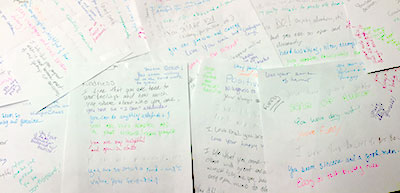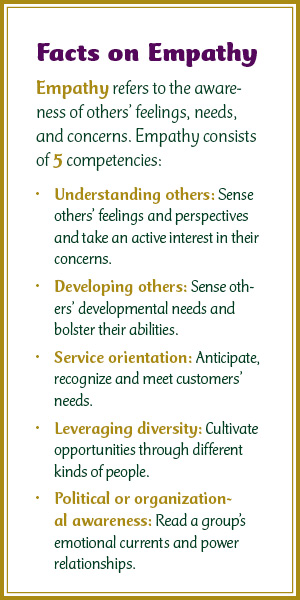What do strengths-based leadership, emotional intelligence, appreciative inquiry and courageous conversations have in common? Together, they form a model of coaching that creates more innovative and higher-performing organizations—organizations that use disruptive innovation to become big, juicy and successful rather than withering on the vine.
This holistic coaching model enables people to generate creative solutions to challenges within their workplaces—through disruptive innovation. Capiche uses this model with great success when working with individuals, teams and organizations.
Three scholars from Chicago’s Concordia University are studying this model and its effect on emerging leaders: Kathryn Hollywood, Donna Blaess and Claudia Santin. I saw them present the concept while I was at the University of New Mexico Mentoring Institute’s Eighth Annual Conference last week. I left the presentation with a huge smile on my face. They were speaking my language!
I share their belief that for today’s and tomorrow’s organizations to thrive, they must rely on the innovations of their people. For people to freely innovate, they need a positive mindset. This mindset can be fostered through a holistic coaching model that blends strengths-based leadership, emotional intelligence, appreciative inquiry and courageous conversations.
Let’s Look at Each Component
Strengths-Based Leadership
Strengths-based leadership asserts that people are at their best when maximizing their strengths vs. struggling to be mediocre at everything. As Gallup has discovered over nearly 20 years of researching individuals, teams and organizations, leaders who encourage people to develop their strengths can create a powerful organization comprising teams with complementary strengths. A holistic coach can stimulate the development of strengths, inspire the use of strengths in new ways and illuminate accomplishments while nurturing continued growth and development.
Emotional Intelligence
Emotional intelligence (EI), first introduced in 1998 by Daniel Goleman, is a combination of awareness of self and others—and the ability to manage one’s self and interactions with others for positive outcomes. Some of the benefits of higher EI include greater self-awareness and self-confidence, deeper empathy and a richer capacity to lead and manage change. Other benefits include better health, relationships and overall quality of life. The beauty of EI is that—unlike IQ—it can be increased. Doing so starts with self-awareness, and a coach can be instrumental in a person’s endeavors to increase his EI.
 Appreciative Inquiry
Appreciative Inquiry
Appreciative inquiry (AI) focuses on what an individual or organization does well. It shifts the focus from solving problems to multiplying successes. Originally introduced by David Cooperrider in 1986 as a strategy for organizational change, it also is a powerful tool for individual change. As Drs. Hollywood, Blaess and Santin write, “Using AI, the holistic coach will invite the coachee to reflect on specific events or experiences to: a) identify her most outstanding personal accomplishments, b) discuss the learning from these accomplishments, c) identify her values, d) describe five adjectives that describe her ‘at my best’ engagement and e) dream about her contribution to the organization and the world.”
Courageous Conversations
Courageous conversations can only occur in a fearless environment—a place where people are free to try new things as well as to fail. This becomes possible when emotionally intelligent people—working from their strengths—come together to achieve good things and build upon that which is already working. In a trusting and respectful environment, people can share, listen, explore and engage. This is a space where new ideas are born, fresh ways of thinking are embraced and innovation is possible.
The Role of Coaching
We know coaching works. The ICF 2012 Global Coaching Client Study shows most clients reported improved work performance, better business management, more efficient time management, increased team effectiveness and more growth and opportunities. The same study found coaching clients noted greater self-confidence, enhanced relationships, more effective communications skills, better work-and-life balance and an improvement in wellness. The median suggests a client who achieved financial benefit from coaching can typically expect a ROI of more than three times the amount spent.
It’s clear coaching supports and sustains the individual growth needed for high-performing organizations. Holistic coaching focuses on appreciating strengths, developing greater emotional intelligence, opening communication and getting more of what’s already good. This contributes to the organization’s success by maximizing performance, productivity and ability to innovate and change—while developing individuals’ potential and connection to their life’s work.
The ICF study reports that 86 percent of companies say they made their investment back. In fact, 19 percent saw a ROI of 50 times their investment, while another 28 percent saw a ROI of 10 to 49 times the investment.
Get Started Now
Are you ready to go to the next level? Is your organization ready? Let the disruptive innovation begin! Capiche specializes in holistic coaching for individuals, teams and organizations. Call 541.601.0114 or email Chris Cook to see what coaching can do for your organization.





 Appreciative Inquiry
Appreciative Inquiry




 If you are game to play along, here’s your assignment: choose a person and situation, and then experience what it is like to fully understand that person’s feelings, needs and how they are responding or reacting to a situation. Observe and sincerely attempt to understand their perspectives without judgment. This will require being present to the person, reflecting and practicing active and empathetic listening. Inquire how they are feeling and see how close you are to understanding what they are experiencing during the situation. Notice how this makes you feel and how the person responds to you.
If you are game to play along, here’s your assignment: choose a person and situation, and then experience what it is like to fully understand that person’s feelings, needs and how they are responding or reacting to a situation. Observe and sincerely attempt to understand their perspectives without judgment. This will require being present to the person, reflecting and practicing active and empathetic listening. Inquire how they are feeling and see how close you are to understanding what they are experiencing during the situation. Notice how this makes you feel and how the person responds to you.



